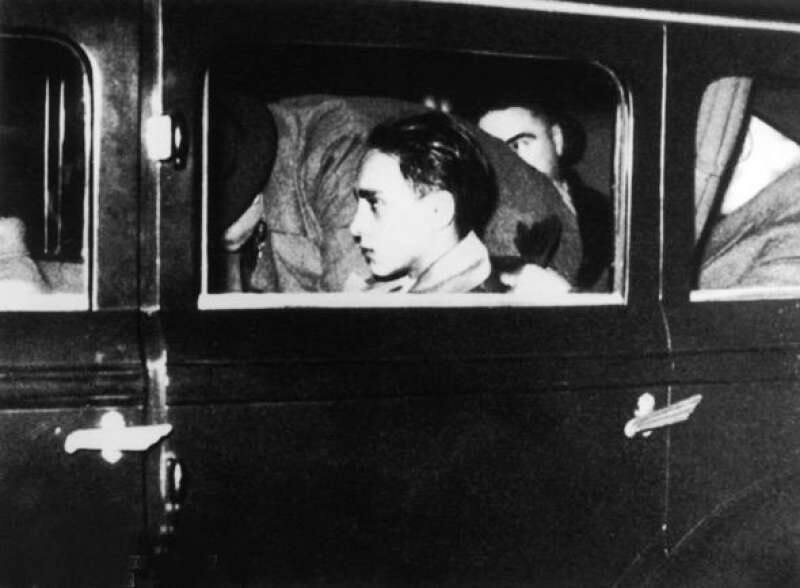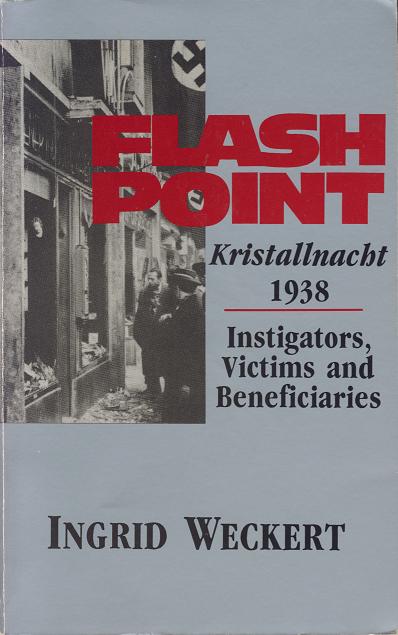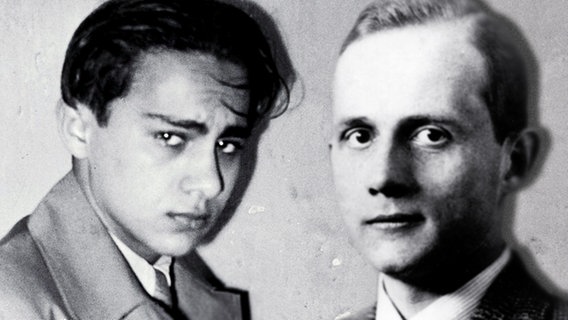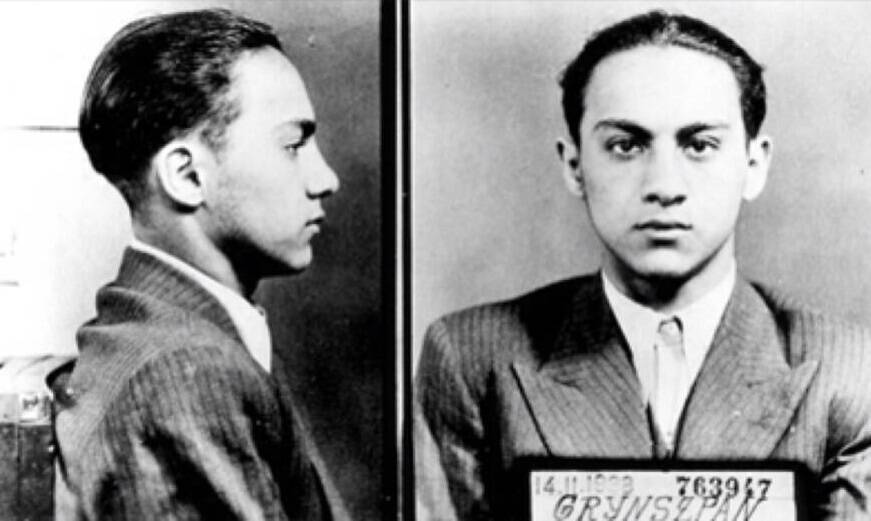A closer look at Kristallnacht 1938 - just another Jewish hoax?

Seventeen year old Herschel Grynszpan in Paris police custody after murdering German Embassy Secretary Ernst vom Rath in cold blood, on the morning of November 7, 1938.
By Carolyn Yeager
 FLASHPOINT Kristallnacht 1938: Instigators, Victims and Beneficiaries by Ingrid Weckert
FLASHPOINT Kristallnacht 1938: Instigators, Victims and Beneficiaries by Ingrid Weckert
Translated by Mr. Carl Hottelet from the original German
English translation Copyright 1991 by Institute for Historical Review in arrangement with Grabert Verlag, Tübingen, Germany
_______________________________________________________________________________
I VERY RECENTLY RECEIVED THIS BOOK IN THE MAIL from a woman named (looks like) Raina P. from Ottawa, Ont. Canada. Thank you Raina! It's perfect and came at a perfect time. How did you know I wanted this book when I didn't even know it?
[This is also a good time to point out that I have closed my P.O. Box and no longer have a public mailing address. If someone really wants to send something to me, email me at [email protected] and inform me. I will see if I can arrange a way for you to do it.]
I had read this book online quite some years ago, but I'm not sure all the beginning chapters were included, as they seem new to me. That is Chapters 1 thru 6, and the Foreword. I'm so impressed with this information that the first installments of my “review” will deal with only these pages consisting of 5-39.
The Foreword is titled “In Place of a Foreword” and begins with four pages written by Wilfred von Oven, Joseph Goebbels' personal press advisor for the last two years of the war, assigned by the Wehrmacht High Command press section. In von Oven's opinion, the strongest argument against the charge that Goebbels instigated the violence on the night of Nov. 9, 1938 was his “extraordinary intelligence”—he was too smart to do such a dumb thing. Everyone involved agreed how wrong-headed the riot was, how disastrous its effect on Germany's standing among leading Western nations with whom it was at the time seeking to build respect and acceptance. Von Oven wrote in 1981:
“Pograms were an item of daily routine in Eastern Europe, but had not happened in Germany or in other civilized countries of Central and Western Europe since the Middle Ages, not even as a consequence of the Dreyfus affair in France (1894), in the course of which the people's long-accumulated anti-Jewish sentiments broke to the surface. Pogroms, manifested by looting, burning, and killing, were—as is the word—of Russian origin, and are unworthy of a civilized nation. The indisputable power of the Jews in Germany had been broken legally in 1933 by National Socialism. The German people, through their government .. via the Nuremberg Laws, had established a clear dividing line to separate the Jews who were held to be unrelated to them by blood. And now—in 1938—suddenly a pogrom?”
There was also the fact of “no evidence” for the accusation against Goebbels. This “Jewish pogrom” had occurred directly after the Munich Conference and the (First) Vienna Arbitration through which the respect for Germany had reached its high point internationally. For that very reason, Goebbels had reduced his anti-Jewish propaganda campaign to a minimum. To Goebbels and to Hitler, propaganda was seen as a function of politics. Von Oven again:
“But then, who perpetrated, or at least inspired, the Kristallnacht? The victors have had thirty-six years (up until 1980) and all the means to clarify this question that, after all, is not without importance. They haven't done so. For understandable reasons. They would have destroyed the myth they had invented, that the Kristallnacht was the beginning of the “final solution” (as they represented it). Instead, as November 9th and 10th came around for the fortieth time (in 1978), the fable of the “nazis” and of Goebbels, very especially, as instigators of the Kristallnacht was served up once again, when all reasonable reflection pointed in the other direction.”
The last page and a half of the Foreword is from Ingrid Weckert. She begins with a quote that so impressed me I have to give it in full.
We must not treat lightly, and least of all by surrendering ourselves demeanly, a question that goes to the root of all the hatred against us [Germans]. If we correctly understand precisely this question—How is it that we can be hated so deeply, as though we were barbarians?--and delve into it, we will become more conscious of the certainty of high-mindedness in German life, without self-presumption and without self abasement. --E. G. Kolbenheyer (from Wem Bleibt der Sieg? [For Whom the Victory?] in “Essays, Lectures, Talks,” p. 40l)
[If you think hatred against Germans is a “trumped up” idea, I assure you it is real. Go to my page under Hostility Towards Germans [https://carolynyeager.net/hostility-towards-germans] and click on any of the nine articles I've posted under that heading.]
Weckert's main point, as I see it, is that we—and historians—still haven't answered the questions: Why? And what?
“The night of 9th/10th of November, besides being shameful and tragic, can be seen from another aspect, an extremely strange one: its events have not been cleared up to the present day! Two generations [now four -cy] after the assaults and the murders of that night, we know as little about the instigators and the motives that impelled them as we did when it all happened. Although in the years after the German defeat a veritable dragnet was undertaken to ferret out and to seize all Germans suspected, somewhere at some time of having once touched the hair of a Jew, no effort was ever made to find the organizers of this Kristallnacht and bring them to account.” [my emphasis -cy]
She notes that only one serious study of this subject in the German language has been published—it is Der 9.November 1938: Reichskristallnacht, Hermann Graml, published by the Federal Center for Homeland Studies in Bonn. Apart from this, there is no certainty or transparency of this “whole traumatic episode.”
And still not today, in 2022. Thus it's important to take a look at what we can.
Chapter One is titled “The Grynszspan Case” and covers what facts were known at Weckert's time of writing, 1978. The problem started only a month earlier, on Oct. 6 and Oct. 15, 1938, when the government of Poland suddenly announced that henceforth all Polish passports must bear a control-visa in order to remain valid for re-entering Poland. Around 70,000 Polish Jews then living in Germany would be unable to return to Poland without it. Thus the German foreign office saw itself forced to expel all Polish Jews from Reich territory as quickly as possible. If Jews became stateless while in Germany, they would become a burden on the German State with no place to legally send them. Weckert emphasizes that it was not the intention to expel these Polish Jews permanently, but only to see that they returned to Poland to obtain the required re-entry visas for their passports to remain valid.
This unnecessarily-provoked “passport crisis” was indicative of the hostile Polish government toward the Jews. It did not want them back.
German Ministerial Director Dr. Werner Best reported that “about 15,000 Jews—mostly adult males—were taken into custody in the entire Reich for deportation, and were taken to the Polish border in special transports.” Sanitary personnel and abundant food accompanied the trains.
There was difficulty with the Polish authorities accepting the Jews, but after complicated diplomatic efforts behind the scenes, most of the Polish Jews came back to Germany with the required re-entry visas. Among them were the parents, brother and sister of 17 year-old Herschel Grynszspan, who was himself living in Paris. While in Poland, Father Zindel Grynszpan reportedly wrote a letter to his son in Paris about the journey and his situation. The media version of the story is that Herschel, outraged over the fate of his family, buys a revolver, takes it to the German embassy in Paris the morning of November 7, shoots the Third Secretary Ernst vom Rath, who dies in a hospital on the afternoon of November 9.
But the more interesting details from the court records were that Herschel was not a good student. His school reports were bad, even from Hebrew school. That's why he left his family in Germany at age 15, going first to Essen, then Brussels, finally to his uncle in Paris. Here, he fell in with bad company, was picked up in a police raid, and in August 1938 ordered expelled from France. But he didn't leave. His uncle had forbidden Herschel use of his home, so Herschel went underground, taking a room in a small hotel, one street away from his uncle's residence. Ingrid Weckert asks, How did he live? Who paid his room, his meals, his maintainance? What did he do all day?
“Then one day he got word that his family had been expelled from Hanover and taken to Poland. How did he get this news? … Herschel was nowhere listed and lived underground. But his mail was delivered nonethless?”
On Nov. 7, he gets up early, walks one block to an arms shop and buys a revolver for 250 francs.
“Quite an accomplishment for a young man who had no money and no identification, n'est-ce pas? Did he know how to fire a revolver? Where did he learn?”
Pocketing his weapon, he walks to the German Embassy where he inquires to see the the German Ambassador, and is directed to the Bureau Chief, Nagorska. Nagorska takes him to Legation Secretary Vom Rath who, at this early hour is the only one present. Vom Rath was hit with two bullets.

Grynszpan on left; Vom Rath on right.

Herschel Grynszpan mugshot.
“The police record shows Grynszspan's murder motive to have been the wrong done his parents in Germany. At least, that was the heroic declaration he made at his initial questioning. Later, step by step, he withdrew from this line; it was an accident, the automatic pistol went off by itself; he wanted to kill only himself; he no longer knew how it happened; he couldn't remember at all, as he had acted under hallucination. A scene that had already been enacted at the David Frankfurter trial—that we shall be taking up in due course—followed almost verbatim.”
The preliminary investigation was concluded in August 1939. A final report was issued. By September and October war had broken out; the trial was not held. In 1940, after the defeat of France, the Paris police gave Grynszpan over to the German authorities. A German trial was never held. Why, remains unknown. Even Professor Dr. Friedrich Grimm, attorney for Vom Rath's relatives, did not learn a reason. The American Joint Distribution Committee helped the Grynszspan family emigrate to Palestine. Herschel survived the war, took another name and went back to Paris where, presumably, he had good connections.
There were ample grounds to suspect a connection with a certain Jewish organization, but Herschel maintained an iron silence. In a state governed by law, “generally known facts” are not evidence. [Except in postwar "Holocaust" trials, that is. -cy]. One reason for suspicion is that between the room he rented in the small hotel on the Boulevard de Strasbourg and his uncle's house, was a building that had nothing to attract attention except, perhaps, a small sign at the entrance door that read LICA. He had also continued to visit his uncle Abraham Grynszpan almost daily. And immediately after his arrest, a Parisian attorney named Vincent de Moro-Giafferi appeared at the police station and announced he was assuming Grynszpan's defense! We shall be looking at the interconnections between LICA (Ligue internationale contre l'antisémitisme) and Giafferi next.
Who is Ingrid Weckert? A short biography from Castle Hill - CODOH:
Ingrid Weckert, a German citizen living near Nuremberg, is best known for her book on the events leading up to Kristallnacht – a book called "Feuerzeichen" (Flashpoint). She has been subjected to police raids, during one in which Ernst Zündel was arrested in her apartment in Munich. A former tourist guide for travel agencies, she reads and speaks Hebrew. She knew Menachim Begin and other Jewish leaders personally and frequently visited Israel. In 1998, she was tried, convicted and fined DM 3,500 for writing a Revisionist article. She now lives at the edge of poverty from a small pension.
Category
Historical Revisionism, Jews, Kristallnacht- 2713 reads










Comments
Original vs online copy
I, too, read this book online, I believe it was around 2004-5 or so. I looked it up just now and nothing is to be found online, I wish I had saved it back then. Like you said, I remember having a feeling that it was not the complete version as something was missing. Now that you have this hard copy, could you please let us know if indeed the online copy was incomplete and by how much? I wonder if this book can still be found in a print version or at least online but complete (hint-hint!!). Perhaps this Raina P. lady can tell us where she found it?! (btw, the capital city of Canda, is spelled Ottawa not Ottowa). Thanks!
On Flashpoint's unavailability
I fixed the spelling, thanks. I don't see it available online either after a light search, except for $177.00 on Amazon. No PDF's. I am surprised; our situation is always worse than I think it is. You can read her book "Jewish emigration from the Third Reich" on Internet Archives. Castle Hill Publishers has this page on her: https://holocausthandbooks.com/index.php?author_id=8
Around the same time you did, I read it on Majority Rights website, which was very different than it is now -- the website, that is. It was either not complete or I didn't read the entirerty. I was doing a whole lot of reading at that time. For what it's worth, I see the book's pages given as 347, but that does not include the several pages of footnotes, a bibliograpy and a Glossary of Persons Mentioned, which adds up to 40 pages; that would account for the 375 pages in my book.
Now I see this book gift as all the more special; I so appreciate it. Perhaps I should go into more detail in my 'report.' Then an effort to take me down might be increased, too. I will add that this book was published by IHR back when it was a great holocaust revisionion organization. Controlled for many years now by MARK WEBER (who has switched his allegiance to accommodate the Jews), it holds the translation copyright yet has chosen not to make a new printing !!!! Write to him and ask for it.
Just joooooed out
I de-kiked in the early 90s before my brain had fully developed. Thank goodness. Funny ting is what provoked me to de-joooo was uhhh hardly worth even a mention. Fair to say I've heard wayyyy worse since and honestly what moar proof could possibly be necessary.
Geez. Talkabout dog piling it on. Not that it's not fully warranted but gosh I'm Syrisorta if nothing just simply give out.
And get this...I'm, i believe, still mostly ignorant about 98.9% of the evil they've done and planned to do.
I do appreciate your articulate voice in these jooooo times that do not seem to me to have any end in sight but hey I'm near-sighted soooo...
Geez. Sure would be nice to...i can't think of anything.
Good job Carolyn.
Can't believe they haven't come for ya.
Thanks
Thanks for this work of yours Carolyn. It's exactly right for me, not having an inclination to make a full-going study of it, in order to keep me clear in my own mind at least on what Hitler's Germany was really about.
I find myself taking mental notes in the event of a confrontation on Kristallnacht. I'm fantasizing in my head, but the liklihood of that is less than it used to be.
Bruce
I'm sure, like me, you're getting up in years. I hope you're doing as well as I am with it. Look after yourself and keep in touch. You're a friend.
Hi
66 now and never felt better. There are littile bothersome things as always (like No Hair No Where which started back in '92 and progressed through 2-Tone (a nick name) much all white (which certain parties found irrisistable while others were immediatley offended) and the current state) Cognatively funtional so far as I can tell, so happy so far, thanks, and very glad to hear your reply.
Carolyn,
Carolyn,
It's always a special treat to see a new post arrive in my e-mail inbox from you; and I also greatly appreciate the resource information in your coment above. Thank you for letting us know about the post office box. Please be well.
I am well
Thanks so much, Astrid, for your well-wishes. Since I've always been health-and-diet-conscious, it looks as of now that I could get to 100 if I wanted to. That last part is the operative question! Anyway, I have a new burst of enthusiasm, which happens to me at the beginning of every year, so I just can't keep myself down! LOL. I will ride this wave and see where it takes me. I have plenty of resources, and we can't take it with us.
I do also have to thank Raina P. for following her inspiration, and sending this hard-to-find book just in time! It was there on my last visit to my PO Box!
SS Hans Schmitt
I have SS Hans Schmidt's book END TIMES/END GAMES.
He mentions, on page 110, that Ingrid Weckert "traces the orders for the SA excesses to Zionist organizations in Paris...who impersonated higher SA-officers."
Given the inside job of 911 (2001), where Israel had influence on US communications, and that such is a great stategy to infiltrate and subvert the chain of command, and that it was on 11-9 (1938), it could well have been an operation.
I'm sure her book has a whole lot more to say about that.
"De-Kike Your Brain" would make a great T-shirt. :)
Carolyn, do you have any of Hans Schmidt's newletters?
Hans Schmidt
Carolyn, do you have any of Hans Schmidt's newletters?
No, I don't. Do you want to send me some?
I see one on Archive.org [https://archive.org/details/GanpacBrief219/mode/2u]. I'll read it when I get time. He also has a page on Wikipedia.
Since Wiki is uncertain whether the page should be there or not, people should write in or in some way urge Wiki to keep it there. Obviously, there's a campaign to remove it.
No Why. No Gasacaust.
The issue of "What purpose does it serve?" is an exculpatory question.
Hannah Arendt admits the same as to the GASACAUST. Without a "why?" the gasacaust is UNREAL.
What purpose does it serve to drive people back and forth on trains? Or to, specifically, gas them with a specific gas? Or to gas them in wartime, when they are building weapons and war materiale you need to win?
The presumption is that large-scale human action is purposeful to exist.
Without a "why" such things do not exist.
If they don't have a why, they don't have a gasacaust.
if they don't have a why to the Kristallnacht, they can't pin it on Hitler or Goebbels.
No 'Why'
They don't follow those rules, you know.
Very good post as always.
Carolyn, I hope you´re in good health.
Good enough, Vald.
Good enough, Vald. And you also.
Very interesting
I wonder how long the walk was berween "the room he rented in the small hotel on the Boulevard de Strasbourg and his uncle's house".
A block and a half?
I think it was only about a block, Peter. And around the corner. It's very possible his uncle was in on it too. An all-Jewish cast of characters. Ingrid Weckert was not going to go into anything she didn't have evidence for, and since no one was asking questions, it will never be known for sure (about the uncle).
Even the Hitler regime probably figured it had more important fish to fry in 1938 with their limited resources.